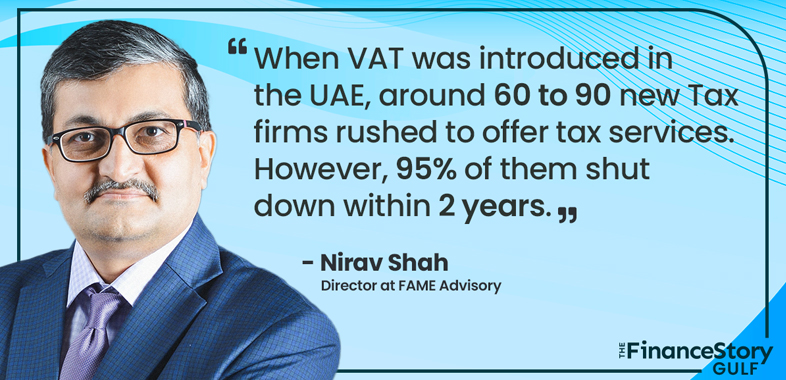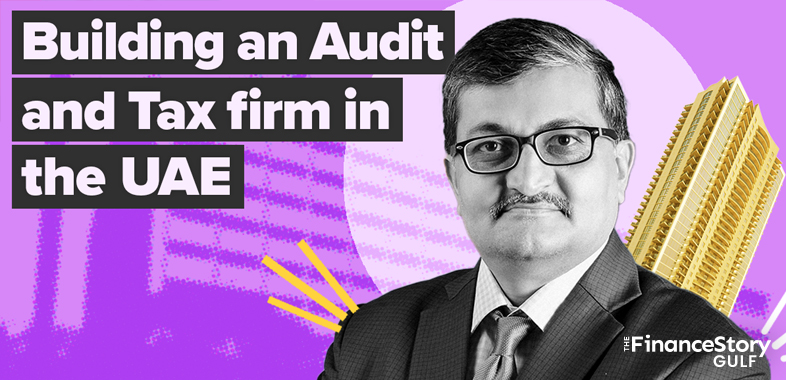In 2014, CA Nirav Shah started Fame Advisory, a boutique Tax firm in the UAE…. despite the UAE having a tax-free status.
He focused on International Tax consulting, aiding companies in setting up tax-efficient structures and offering advisory services.
Nirav has since observed the implementation of Excise Tax (2017), VAT (2018), and Corporate Tax (2023) in the UAE.
Today, he has a team of 20 professionals and 150+ Corporations and Families as his clients.
As a seasoned Tax Professional, here is his advice to Audit and Tax firms and individuals wanting to start in the UAE.
Background on the UAE Taxation
For a long time, the UAE has been called a tax haven.
Several corporations shied away from doing business in the UAE as they wanted to be labelled as something other than a business operating out of a tax haven.
The UAE took significant steps by implementing various taxes, such as the Excise tax in 2017, followed by a Value-added tax (VAT) at a 5% rate in 2018.
As per the Federal Tax Authority (FTA) in the UAE, more than 300,000 companies are registered for VAT (Value Added Tax), and approximately 1000 companies are registered for Excise Tax.
On 31st January 2022, introducing a modest 9% Corporate Tax attracted several businesses to the region.
Moreover, the UAE has set an ambitious goal of reaching 1 million SMEs by the end of 2030 (presently around 557,000), which presents numerous opportunities for professionals like Auditors and Accounting and Consulting firms.
If you already have an Auditing/ Tax/ Accounting firm performing well in India and envision expanding into the UAE… Here are a few factors you should not ignore.
Advice to Audit, Tax firms and individuals wanting to start in the UAE.
1. High Cost of Operation
- It’s crucial to grasp that operational costs in the UAE are significantly higher due to being an expensive country.
- If your revenue from Tax services cannot adequately cover your office rent, utilities, administrative costs, office supplies, and technology expenses…. Sustainability becomes a challenge.
2. The Break-even Point takes time
- “I have seen many mid-sized Indian Audit firms in Dubai struggling to achieve profitability. They typically take 3 to 6 years to break even, even with client’s referrals,” says Nirav.
- Smaller audit firms that do offer tax services may be able to attract more clients, but they often need more expertise to provide tax advice at a premium rate.
- As a result, they may have to rely on lower-margin audit services to generate revenue.
- Considering these factors, building revenue with only tax services can be time-consuming.
3. Client interaction is key
- For Indian firms wishing to expand to the UAE, being physically present and interacting with the local community is vital.
- This builds confidence among potential clients that you’re committed for the long term and can provide substantial value addition.
4. Need for long-term planning
- Nirav Shah says, “When VAT was initially introduced, around 60 to 90 new Tax firms rushed to offer tax services. However, within just two years, 95% of them had to close shop.”
- The Compliance requirements for VAT in the UAE are less stringent (as compared to the GST system in India). A mere commerce graduate can adeptly handle and organize data for VAT returns with little difficulty.
- As soon as the businesses realized this, they opted for an in-house tax team to handle the same.
- Plan for the long term, not just for 3-4 years…. It takes time to build a setup and name for your business.
5. Set up a proper office
The concept of remote offices for Consulting firms does not make sense; You must have an office with a team familiar with the UAE’s tax and accounting laws.
6. Team is key
You have to build a team with experienced professionals to succeed. You and your team cannot sit in India and expect to get clients.
Hiring good professionals is key here.

The future of Tax-related work in the UAE
There may be an influx of Tax Consulting or Advisory work because of Corporate Tax, but this trend won’t persist next year.
Clients will eventually require services related to compliance work, which is predicted to begin in full force by 2025.
And most likely, companies will shift these tasks in-house due to their simplicity and cost-effectiveness.
Still, if you want to take the leap and build a firm in the UAE, adapting to the local laws, investing time and resources, strategic thinking, and careful market evaluation are necessary.
So, if you consider all the above aspects, the UAE / GCC can be the perfect destination.
Are you considering building your own Audit or Tax firm in the UAE? Share your thoughts in the comments.







